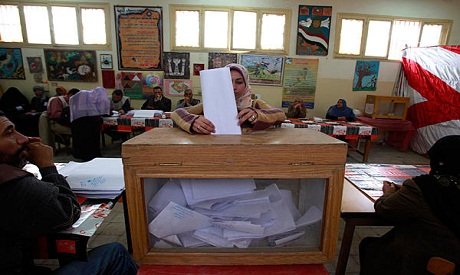 The Muslim Brotherhood's Freedom and Justice Party (FJP) will win a majority of seats in upcoming parliamentary elections, the party's media advisor predicts.
The Muslim Brotherhood's Freedom and Justice Party (FJP) will win a majority of seats in upcoming parliamentary elections, the party's media advisor predicts.
In an interview with the pan-Arab Asharq Al-Awsat newspaper on Sunday, Mourad Ali turned the tables on opposition groups calling for an election boycott, stating: "If the opposition won a majority and formed a government, would [the FJP] demand a new cabinet be put in place two months prior to parliamentary elections?"
Commenting on recent outrage that parliamentary elections would begin on 27 April during a Coptic Christian religious festival, Ali said: "We [the FJP] support changing the start date of elections so it does not interfere with [the religious festival of] our Coptic brothers."
The start of the election has since been rescheduled earlier to 22 April.
Ali said all national factions could still reach a consensus with the government and take part in competitive parliamentary elections.
"The space is open for competition," Ali added.
In the last parliamentary elections, the FJP won 43 percent of seats in the lower house, and 59 percent in the upper house.
Brotherhood condemns election boycott threats
The current political unrest in Egypt is due to the lack of an "objective" opposition, Ahmed Abu Baraka, a prominent Muslim Brotherhood leader, has said.
"[Political groups] are at variance and always will be. It is in our interest to be different," Baraka said in an interview with Sada El-Balad TV channel on Saturday.
In less than two years, Egypt has travelled a long way on the road to democracy, Baraka said. It took free countries like the United States, England and France centuries to reach where we are, Baraka added.
Under the current democratic government a simple notification is required to establish a political party, which can then hold press conferences and publish newspapers without hindrance, Baraka asserted.
"In less than a year and half, Egypt has witnessed five free, transparent, democratic elections applauded by the whole world," he claimed.
Baraka, who is legal advisor to the Muslim Brotherhood's political party, said opposition calls for an election boycott were "the climax of political weakness."
"Political forces should compete in elections and seek to muster enough popular support to win," he said.
Opposition forces have been calling for a boycott of upcoming parliamentary elections, claiming they were not consulted on the new elections law.
On Saturday, Mohamed ElBaradei, co-founder of the opposition National Salvation Front (NSF), called for a boycott of the parliamentary poll, saying he would not be "part of an act of deception."
Other opposition figures have echoed similar sentiments, including liberal former MP Amr Hamzawy, and Hamdeen Sabbahi, founder of the Egyptian Popular Current.
Before the election schedule was announced, the NSF demanded the election be postponed and that guarantees be made regarding judicial and international oversight of the voting.
The NSF has yet to announce its official stance on the election.
Senior NSF leader Ahmed Bahaaeddin has said the front will announce its official position on the elections on Monday at the latest.



